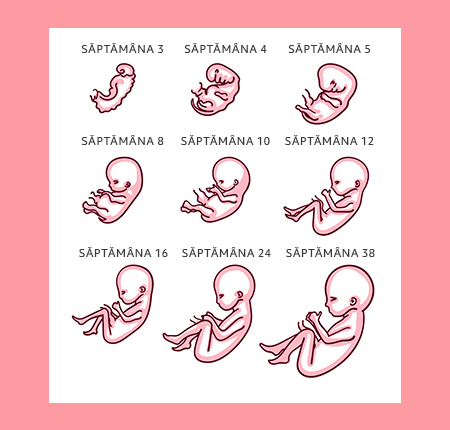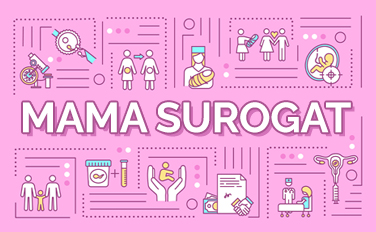
Abortion and all it means
Abortion - EVERYTHING you need to know about this procedure
Abortion is a medical procedure that ends a pregnancy. It is a basic medical need for millions of women, girls and others who can become pregnant, and worldwide it is estimated that 1 in 4 pregnancies end in abortion each year.
As common as such a medical intervention is, it is less discussed, which has led to the emergence of a wave of erroneous information in recent years, which does not at all help women who want to educate themselves about it. Such a taboo hides behind various stories, some happy, others less so, but also many controversies and contradictory discussions. Today we tell things by name, from what abortion is, to the types of abortion, the preparation, the process and the recovery afterwards, what is the price of such an intervention in Romania, and we answer many of the questions you probably asked yourself woman.
What is abortion?
The definition of abortion differs depending on how it occurred. So, we call abortion either the sudden loss of pregnancy up to the 20th week of gestation (called spontaneous abortion), or the voluntary abandonment of it, in which case medication or surgery is used (called induced or induced abortion).
Abortion involves the termination or interruption of a pregnancy, through a procedure (performed in hospitals or clinics) that empties the uterus, so the embryo or fetus is removed.
Types of abortion
The woman who wants an abortion must know that there are several types of abortion and that this procedure can only be done up to a certain point in the pregnancy. For example, third-trimester abortion is only done if the mother's life is in danger. According to the definition, abortion is the death of the fetus or its removal before the 20th week of pregnancy.
Depending on the method chosen to terminate the pregnancy, there are several types of abortion, and we are talking about all of them right now.
Medical abortion (with pills)
Also called "pill abortion", medical abortion is a non-surgical method of terminating an unwanted pregnancy and is performed by taking two medicines in the form of pills. The first is for the actual loss of the pregnancy, and the second, administered 72 hours later, causes the expulsion of the intrauterine contents. This method can be used for pregnancies up to week 9 and is 95-98% effective.

Compared to surgical abortion, medical abortion carries significantly lower risks, and symptoms you can expect after taking the pill include: cramping in the lower abdomen (like a period), menstrual-like bleeding (sometimes heavier) associated with emptying the sac gestational bleeding that can last from a few days to 1-3 weeks. Side effects include nausea, vomiting, headache, dizziness, diarrhea, weakness, fever, chills, all of which are short-lived.
Women can use medical abortion if they are breastfeeding, have had childbirth (including caesarean section), if they are in their first pregnancy, and regardless of whether they are minors or older. However, this method is not recommended for those with ectopic pregnancy (or suspicion of it), intrauterine device (must be removed beforehand), adrenal insufficiency, therapy with steroid preparations, allergies and others.
Surgical abortion (curettage)
Surgical abortion, also known as curettage, is of two types: aspiration and dilatation and evacuation. Women who are pregnant up to 14-16 weeks' gestation can undergo an aspiration abortion, while dilation and evacuation abortions are usually performed at or after 14-16 weeks' gestation. 
Both procedures take less than 30 minutes. The most common side effects experienced by women include cramping, nausea, sweating, and feeling faint. The risks are higher than in the case of medical abortion and we can talk about heavy bleeding, blood clots, damage to the cervix or its perforation. It's best to talk to your doctor about what's right for your situation.
Induced abortion
An induced abortion is done in the second trimester of pregnancy. It can be an option if the pregnant woman is past the 24th week of pregnancy, because a dilation and evacuation abortion procedure can no longer be done. The woman will receive the necessary drugs that trigger her labor. To expel the pregnancy, her uterus will contract. The gynecologist may also use other methods, such as suction to clean the uterus.
Miscarriage (pregnancy loss)
Also known as miscarriage, miscarriage is the death of the embryo or fetus that was not induced (intended) before the 20th week of pregnancy. A miscarriage is an event that results in the loss of the fetus in the early stages of pregnancy, usually in the first trimester (the first three months of pregnancy).

The causes of miscarriage vary from woman to woman, but often it is because the fetus is not developing normally. These abnormalities are difficult to identify, but the causes of a miscarriage include:
Abnormalities in genes or chromosomes, these occur by chance as the embryo divides and grows, and are not abnormalities inherited from the parents.
Conditions of the mother: diabetes, various infections, hormonal problems, thyroid conditions, problems in the uterus or cervix.
To dispel some myths, it is also good to know what does NOT cause miscarriage:
Practicing physical exercises
Sexual relations
Professional activity (provided there is no exposure to noxious or radiation)
Among the symptoms of miscarriage, the most relevant are:
Vaginal bleeding, accompanied by cramps and pain in the lower abdomen - not every bleeding is a sign of miscarriage, in the first trimester of pregnancy it is even something normal, however it is good to notify your doctor immediately to be able to monitor the situation.
Back pain varying in intensity from mild to severe
Weight loss
White-pink mucus
Sudden improvement in pregnancy symptoms or their temporary disappearance
Although a miscarriage can be an emotionally and physically traumatic experience, it does not necessarily mean that the woman will not become pregnant again. Most women can have a healthy pregnancy after a miscarriage.
Stages of abortion
Depending on the clinical stage of the abortion, there is another classification:
The threat of abortion - occurs when there is vaginal bleeding, but the cervix has not dilated, but is completely closed; most of the time, these pregnancies proceed without problems, these bleedings being in fact the result of the implantation of the fertilized egg in the uterine wall;
Inevitable abortion - occurs when there is a dilation or effacement of the cervix, with its perceptible contraction;
Incomplete abortion - when only part of the embryonic tissue has been removed, and bleeding and cramping may be present and persistent;
Complete abortion - when all the embryonic tissue has been removed, when the bleeding should stop quickly, as should the back pain and cramps; this type of abortion frequently occurs before the 12th week of pregnancy and can be confirmed sonographically or through surgical curettage;
Missed abortion - occurs when the death of the embryo occurred, but its expulsion did not take place, the signs of this type of miscarriage being given by the disappearance of pregnancy manifestations and the absence of the fetal heart rhythm.
Abortion in Romania - Up to how many weeks can it be done?
According to the legal provisions, in Romania termination of pregnancy (abortion on demand) must meet certain conditions:
The pregnancy must not exceed 14 weeks.
There must be consent from the pregnant woman for this medical procedure to take place.
The doctor can also terminate a pregnancy more advanced than 14 weeks under certain conditions, if this decision is imposed by the health of the mother or the fetus. It is important to note that it is possible to have an abortion for therapeutic purposes even later than the 14th week. 
Abortion at 20 weeks - Is it possible?
The vast majority of miscarriages occur by the 20th week of pregnancy. However, the risk of miscarriage exists even then.
Very few pregnancies are lost after the 20th week and most often this happens as a result of malformations of the fetus, the mother's unhealthy lifestyle or due to infections or trauma to the uterus (therapeutic abortion).
If we talk about the case of an abortion on request after the 20th week of pregnancy, most of the time a gynecologist will agree to do it only surgically and only if malformations of the fetus are observed or there is a risk that the health of the woman will be put in danger.
How much does an abortion cost in Romania?
As the state refuses to cap the price of abortions, prices differ by hospital. At public hospitals, such a procedure costs between 500 and 1,500 lei, while at private clinics the amounts are between 700 and 3,000 lei. This price differs depending on the facilities of the hospitals, whether or not you want hospital days, whether or not general anesthesia is used (in the case of surgical interventions).
Preparation before abortion
When we talk about abortion on demand, the woman must understand the abortion procedure and what it entails.
Before the abortion, the pregnant woman will visit a doctor's office to discuss the reasons for the decision, to determine which abortion method is available and suitable for her, and to be informed about the risks associated with the abortion method and complications. The woman will then be consulted and given a pregnancy test to confirm that she is pregnant. The doctor may also recommend a series of laboratory tests before the abortion.

For termination of pregnancy, it is important that the pregnant woman consult a gynecologist, not an unqualified person because her life can be endangered and an improper abortion can lead to complications such as infertility.
Recovery after pregnancy interruption
After an abortion, the doctor will give the woman recommendations and instructions regarding her care. Sometimes these recommendations are not enough to reduce the unpleasant side effects of the recovery period, but it can also help:
Using a warm electric blanket or a bottle filled with warm water to relieve abdominal cramps.
Stay hydrated, especially if vomiting or diarrhea occurs.
Getting the support of a loved one who could be helpful in such a delicate time.
Administering pain-relieving medications and gently massaging the abdomen in areas where cramps are felt.
Also to get through the moment more easily physically, a light form of sport, physical activities that do not put a lot of strain on the body are usually recommended, and a doctor can usually offer exercise suggestions. Nutrition is also very important and although it is not a specific diet, it is good to take care of your balance by making the healthiest choices, which also help the body to regenerate faster.
Probably the most difficult part when talking about an abortion is the emotional implications. Abortion is not a moment that can be easily overlooked, feelings of regret, guilt or shame are likely to arise, and some women may even experience depression.
If the need arises to talk to someone about these conditions, it is good for the woman to turn to a trusted person or consider a few sessions with a psychotherapist. The partner can also be affected by the abortion, so he or she may also need support.
Bleeding after abortion
It is normal to experience light menstrual-like bleeding after an abortion procedure that can last from a few days to a few weeks. As it is not recommended to use internal absorbents, we come to your aid with ENROUSH external organic absorbents. Inspired by the female body, created from 100% GOTS certified organic cotton and gynecologically approved, they are so gentle on your skin and protect you with a super absorbent layer, whatever the day. To feel comfortable and regain your self-confidence, join the ENROUSH world where everything is created with care for you and the planet .

How long does bleeding last after spontaneous & surgical abortion?
Bleeding after miscarriage and surgical abortion can last from a few days to a few weeks. Menstruation also occurs 4-6 weeks after the abortion.
How long does bleeding last after medical abortion?
Bleeding after a medical abortion should not last more than 12 days. In case of heavy bleeding, an emergency medical consultation is recommended.
Pregnancy after abortion
Surprisingly or not, a pregnancy can occur almost immediately after a miscarriage. This means that if pregnancy is not desired, contraceptive methods must be used immediately. Even if an abortion has occurred in a more advanced pregnancy, this procedure should not affect the woman's ability to conceive in the future, but in case of complications there may be a risk of infertility.
Frequently asked questions
To dispel some myths, it helps to answer the most frequently asked questions.
Why are the "baby remedies" not recommended for termination of pregnancy?
Since abortion was illegal until a few years ago, women who wanted an abortion resorted to various extremely dangerous methods at home to induce an abortion, whether it was spontaneous or not. Also during that period, many women got sick and suffered because of "baby remedies", and today we can no longer afford to put our health at risk. Always turn to specialists who can help you with recommendations and choose to have an abortion only in the doctor's office.
Is it advisable to have an abortion at home?
The only form of abortion that you can do at home is the medical abortion and only on the doctor's recommendation. Any other form of abortion can put your health at risk and trigger reactions in your body that you don't want.
Can you have sex after an abortion?
Regarding sex life after abortion, regardless of its type, the doctor usually recommends that the woman wait around two weeks before having sex, as part of the recovery from the abortion.
After how long does your period come after medical abortion?
Menstruation after medical abortion will start as usual or about 2 weeks later.
How long does aspiration abortion last?
The actual procedure takes a few minutes and can be performed under local anesthesia. The woman recovers quickly and there is no need for days spent in the hospital.
Hi!
an ENROUSH account.
Let's create a new account for you!
You're almost there. Choose the checkout method:
Shopping Cart
{{ line.unit_price }} {{ line.product.currency }} / unit per billing cycle
VAT included
-
Subtotal{{ formatPrice(model.cart.total_price) }} {{ model.cart.lines[0].product.currency }}
VAT included






















